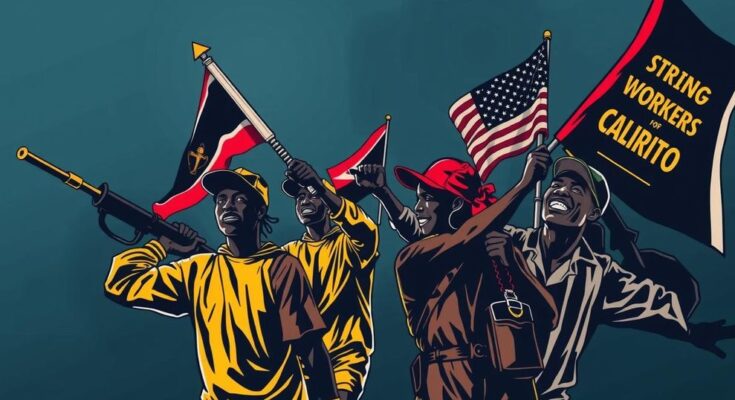The article discusses the increasing trend of labor strikes worldwide, particularly in 2023, highlighting significant unrest in Trinidad and Tobago where workers oppose government actions undermining trade union rights. The Prime Minister of Jamaica has shown support for hotel workers, promising improvements in their working conditions, amid the ongoing struggles of workers across the region seeking fair treatment and compensation.
In recent months, there has been a surge of strike actions across various nations, sparked by economic discontent and labor rights issues. In 2023, the United States recorded an unprecedented number of strikes as workers protested against soaring inflation and unfavorable working conditions. Major companies, including Amazon, witnessed large-scale walkouts, reflecting the growing unrest among employees globally.
In Trinidad and Tobago, workers are currently engaged in a struggle with their government over the erosion of trade union rights. This unrest has seen port workers, electricity and petroleum employees, and others across various sectors, including Caribbean Airlines pilots and university staff, uniting to demand better working conditions and the reinstatement of collective bargaining rights. The workers rejected a meager wage increase of 4 percent over six years while government officials have reportedly enjoyed salary hikes exceeding 40 percent, exacerbating the rising tension.
Amid these developments, Jamaica’s Prime Minister has publicly supported hotel workers who face poor remuneration and challenging working conditions. His commitment to prioritize housing and fair compensation for these workers is welcomed, and it is anticipated this will translate into real changes for Jamaica’s tourism sector. It is imperative that contractual agreements with hotel investors now guarantee decent pay, housing provisions, fully-funded pensions, and compliance with International Labour Organization conventions on working hours.
In light of the ongoing struggles faced by trade unionists in Trinidad and Tobago, it is suggested that messages of support be sent to the National Trade Union Centre (NATUC) as they organize joint actions. The solidarity shown across borders is vital in ensuring that the voices of workers advocating for their rights and dignity are not silenced.
The article highlights a significant trend of labor strikes worldwide, particularly in 2023, where economic challenges and labor rights abuses have provoked widespread discontent among workers. Notably, the United States experienced a record number of strikes, highlighting the strain put on labor markets by inflation and inadequate wages. In Trinidad and Tobago, the government’s moves to undermine trade union rights have sparked high-profile labor actions from various sectors, reflecting a broader pattern of unrest among workers seeking fair treatment and recognition. The situation in Jamaica contrasts this narrative, as the government’s acknowledgment of hotel workers’ struggles signifies a possible shift in labor relations in the region, aiming to provide better conditions for a key economic sector.
In summary, the unfolding labor movements across the globe, particularly in Trinidad and Tobago, signify a growing collective consciousness among workers demanding their rights and fair compensation. The disparity in wage increases between government officials and public sector workers only serves to fuel this unrest. However, there are positive developments in Jamaica, where government support for the hospitality industry’s workers might lead to substantial reforms. The calls for solidarity from trade unions across the region emphasize the importance of unity during this critical period of labor activism.
Original Source: www.jamaicaobserver.com




